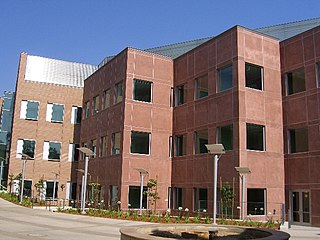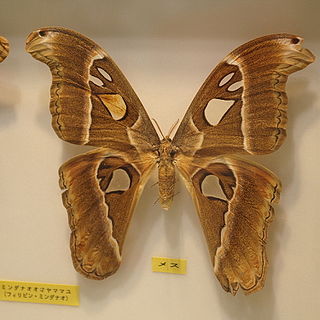
The University of Florida is a public land-grant research university in Gainesville, Florida, United States. It is a senior member of the State University System of Florida. The university traces its origins to 1853 and has operated continuously on its Gainesville campus since September 1906.
The College of Agricultural and Environmental Sciences (Ag&E) is one of four colleges of the University of California, Davis. Established in 1922, it offers degrees in 27 undergraduate majors and thirty-three graduate groups. As of January 2014, the College has been overseen by Dean Helene Dillard.

Citrus greening disease is a disease of citrus caused by a vector-transmitted pathogen. The causative agents are motile bacteria, Liberibacter spp. The disease is transmitted by the Asian citrus psyllid, Diaphorina citri, and the African citrus psyllid, Trioza erytreae. It has no known cure. It is graft-transmissible.

The University of Natural Resources and Life Sciences, Vienna, or simply BOKU, founded in 1872, is an education and research centre for renewable resources in Vienna, Austria. BOKU combines expertise in the fields of natural sciences, engineering and biotechnology as well as social and economic sciences. In research and teaching, it focuses on

Tamil Nadu Agricultural University (TNAU) is the state agricultural university of Tamil Nadu Headquartered in Coimbatore, Tamil Nadu, India.

The University of Florida Institute of Food and Agricultural Sciences (UF/IFAS) is a teaching, research and Extension scientific organization focused on agriculture and natural resources. It is a partnership of federal, state, and county governments that includes an Extension office in each of Florida's 67 counties, 12 off-campus research and education centers, five demonstration units, the University of Florida College of Agricultural and Life Sciences, three 4-H camps, portions of the UF College of Veterinary Medicine, the Florida Sea Grant program, the Emerging Pathogens Institute, the UF Water Institute and the UF Genetics Institute.

The Herbert Wertheim College of Engineering is the largest professional school, the second largest college, and one of the top three research units at the University of Florida. The college was founded in 1910, and in 2015 was named in honor of Herbert Wertheim – a serial inventor, philanthropist and UF Distinguished Alumnus. Located on the university's Gainesville, Florida campus, the college is composed of nine departments, 15 degree programs, and more than 20 centers and institutes. It produces research and graduates in more than a dozen fields of engineering and science including: aerospace, agricultural, biological, biomedical, chemical, civil, coastal, computer, computer science, digital arts, electrical, environmental, industrial, materials, mechanical, nuclear, and systems.

The College of Natural and Agricultural Sciences (CNAS) at the University of California, Riverside, is a nationally unique academic division in that it combines the physical, biological, mathematical and agricultural disciplines under one organizational umbrella. The college is organized into 13 academic departments: Biochemistry, Biology, Botany and Plant Sciences, Cell Biology and Neuroscience, Chemistry, Earth Sciences, Entomology, Environmental Sciences, Mathematics, Nematology, Physics, Plant Pathology and Microbiology, and Statistics.
Joseph C. Joyce, executive associate vice president for agriculture and natural resources at the University of Florida is a Jacksonville, Florida native. He earned his B.S. and M.S. degrees from the University of Alabama. He received his Ph.D. from the University of Florida in 1982.

University of Florida Center for African Studies (CAS) is a center within of the College of Liberal Arts and Sciences (CLAS) at the University of Florida (UF). The Center provides teaching and research into issues of African languages, humanities, social sciences, agriculture, business, engineering, education, fine arts, environmental studies, conservation, journalism, and law.
The College of Agriculture and Life Sciences is one of eight colleges at Virginia Tech with a three-part mission of learning, discovery, and engagement and it is one of the best agriculture programs in the nation. It has more than 3,100 undergraduate and graduate students in a dozen academic departments. In 2013, the National Science Foundation ranked Virginia Tech No. 6 in the country for agricultural research expenditures, much of which originated from the College of Agriculture and Life Sciences.
North Carolina State University's College of Agriculture and Life Sciences (CALS) is the fourth largest college in the university and one of the largest colleges of its kind in the nation, with nearly 3,400 students pursuing associate, bachelor's, master's and doctoral degrees and 1,300 on-campus and 700 off-campus faculty and staff members.
Jimmy G. Cheek is Chancellor Emeritus and Distinguished Professor Emeritus of Higher Education in Department of Educational Leadership and Policy Studies at The University of Tennessee, Knoxville (UTK) and Former Director of the Postsecondary Education Research Center. He is also Professor Emeritus at the University of Florida. As the state's flagship research campus, UT Knoxville is currently ranked as a Top 50 public institution.

Attacus caesar is a moth in the family Saturniidae. It is found in the southern Philippines. It has the second largest documented wingspan of any moth in the world after the white witch moth, at 255 mm (10.0 in).
Agriculture plays a major role in the history and economy of the American state of Florida. Florida's relatively warm climate gives it a competitive position for many markets in the United States. Florida produces the majority of citrus fruit grown in the United States. Bell peppers, tomatoes, sugarcane, peaches, strawberries, and watermelons are also important crops. Florida produces a small amount of wine.
Karen Koch is a plant biologist in the horticultural science department in the University of Florida. She is a professor in the Plant Molecular and Cellular Biology (PMCB) Program, Horticultural Sciences Department, and Genetics Institute at University of Florida.

College of Agriculture, Vellayani is the first agriculture college in Kerala under Kerala Agricultural University and situated in Vellayani, Thiruvananthapuram. The campus has an area of 250 hectare bordered on three sides by Vellayani Lake.
J. Scott Angle is the University of Florida's Senior Vice President for Agriculture and Natural Resources and leader of UF's Institute of Food and Agricultural Sciences.
Bluggoe, Orinoco, Musa'Orinoco', or burro is a cultivar of banana.










